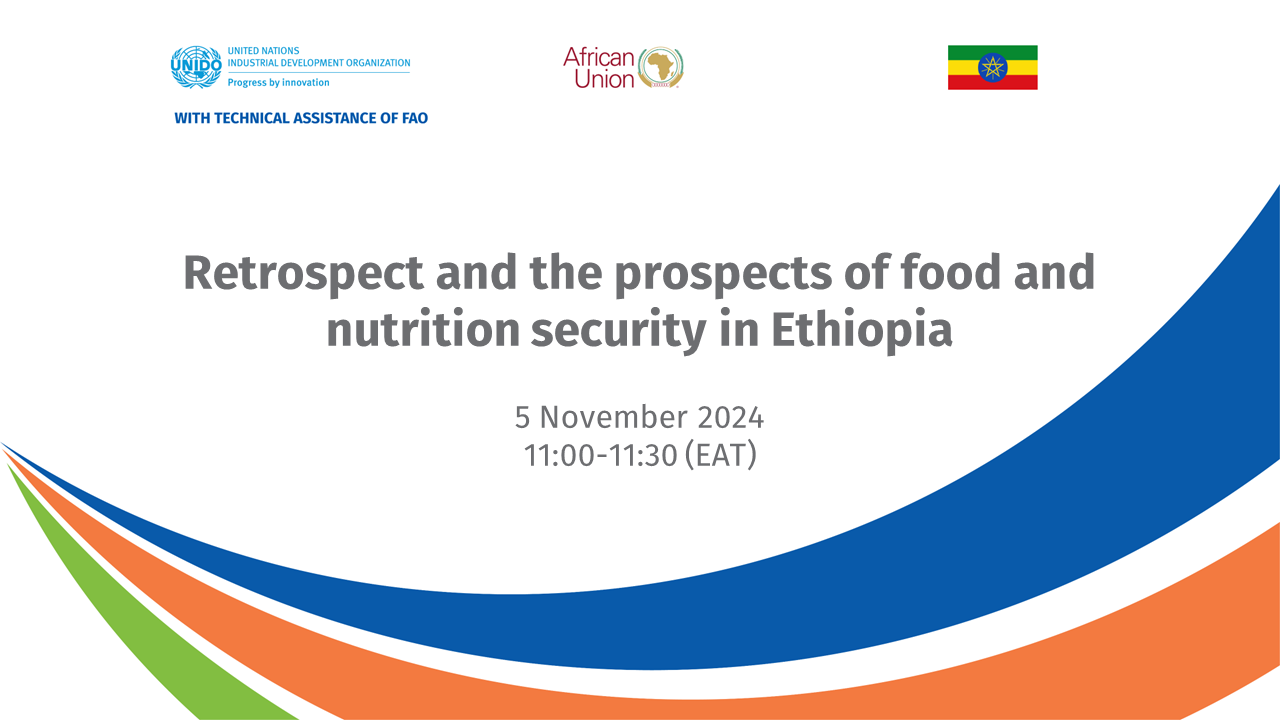


The issue:
Agriculture has enormous potential to serve as the powerhouse driving Ethiopia’s economic development and enabling progress towards national prosperity. The sector is the foundation of food and nutrition security and a rich source of foreign exchange earnings. It creates jobs, wealth, and overall socioeconomic welfare. However, despite the potential and opportunities, the sector's growth is limited by several challenges, and food security has thus remained a major problem. Ethiopia's food insecurity and unsustainable food system are primarily caused by low agricultural productivity, a high dependency ratio (approximately 110%), a high annual population growth rate (2.6%, according to the World Bank), climate change, deforestation, conflict, small size of per capita landholdings, low production capacity, low use of technologies, and poor infrastructure.
The session will highlight past and current initiatives and achievements in agriculture development and success stories in food and nutrition.
To tackle the multitude of socioeconomic problems, the Government of Ethiopia formulated the “Home-grown Economic Reform Agenda (HGER): A Pathway to Prosperity" in 2019. Included under this rubric are various policies, strategies, programmes, and initiatives aimed at agricultural and rural development.
The large-scale government programmes and initiatives being implemented have enabled transformative change. Import substitution of wheat has been achieved mainly through the National Irrigated Wheat Initiative, which has enabled the expansion of wheat production from low acreage and production six years ago to cultivation on 3 million hectares, yielding 10.8 million tons of wheat. The Green Legacy Initiative (GLI), has become a global success story for climate action, and has led to an increase in Ethiopia’s forest cover, 17.2% in 2019 to 23.6% in 2023.
The recently launched initiative ‘Ye Lemat Tirufat’ (Bounty of the Basket) has also resulted in significant improvements in the production of selected livestock commodities, and productivity of the sector.
The Agricultural Commercialization Clusters (ACC) Programme is one of the flagship initiatives that promotes the use of improved agricultural practices based on modern input, technology, access to extension services, and markets. It is a pioneering initiative that has brought together approximately 9.2 million smallholder farmers to operate in clusters with a total landholding of 8.6 million hectares in the last five years and has enhanced the use of agricultural inputs by beneficiary farmers.
Likewise, Ethiopia recently developed a comprehensive roadmap for its food and nutrition system that aims to accelerate growth by identifying 24 game-changing solutions. It is also closely aligned with Ethiopia’s national policy agenda, including the Home-Grown Economic Reform Agenda and may in fact help in the evolution of the same. Ethiopia's Productive Safety Net Programme (PSNP) is a large national social safety net (SSN) programme that responds to chronic food insecurity among Ethiopia's poor, shorter-term shocks, mainly droughts and natural disasters and helps manage climate risks.
Objectives:
To provide an overview of Ethiopia’s agriculture sector development, food and nutrition security progress, including the sector's contribution to GDP, export earnings, job creation and improved livelihoods.
Share success stories and scalable agricultural, food and nutrition security practices from the “Home-Grown Economic Reform Agenda”. These have been designed to spur macroeconomic, structural, and sectoral reforms.
Provide recommendations for action, such as harmonizing efforts, mobilizing public-private partnerships, attracting international investment and enhancing technological cooperation across borders and amongst institutions to address complex challenges of food security.
Key guiding questions:
How can we jointly address the complex challenges in the agriculture sector including rapid population growth and climate change?
What role can be played by sustainable agro-industrialization, technological advancements, and strategic infrastructure development in ending hunger and ensuring food security while mitigating the impacts of climate change?
What are the critical challenges and opportunities in creating equitable and resilient food systems that balance economic growth, environmental sustainability, and social responsibility?
What are the most effective strategies and key success factors in fostering public-private partnerships and international investment and technology cooperation to create synergies between Sustainable Development Goal (SDG) 2 and other SDGs, particularly SDG 9, while tackling the issues of food security and sustainable industrialization?
What are the most promising public and private investment and partnership opportunities to improve competitiveness, promote inclusive and sustainable practices and enhance market access and fair trade?
Expected outcomes:
To provide an overview of the country’s novel initiatives, overall efforts and achievements in agricultural development and food security.
Clarification and elaboration of the role of public-private partnerships and the need to mobilize resources from a wide range of stakeholders worldwide to address climate change and attain food and nutrition security.
Showcasing of successfully concluded investment projects and highlighting immediate investment plans in agriculture, agri-businesses, and management of post-harvest losses agricultural produces.
Session format and structure:
The session will begin with an illustrated keynote presentation covering the Ethiopian experience, highlighting the key initiatives and achievements by the Government of Ethiopia. The presentation will elaborate the agricultural transformation and the role of partnerships with international financial institutions and the industry.
Speakers

His Excellency Mr. Girma Amente, Minister of Agriculture of Ethiopia
Dr. Girma Amente was appointed Minister of Agriculture of the Federal Democratic Republic of Ethiopia in January 2023. Throughout his career, he has been actively involved in agriculture transformation processes by crafting actionable and transformative initiatives at the national level and as Vice President for Oromia Regional State Agricultural and Rural Development. He has served as the Minister of Public Enterprises and President of Haramaya University. He is actively involved in various development activities initiated by governmental, non-governmental, private, and civil society.
He is one of the leading role players in designing an effective development approach and strategies to ensure food security and alleviate poverty in the country due to which he has been given an award of a medal for his best performance from the Oromia Reginal State.
Minister Girma received Ph.D. in the Silviculture Albert-Ludwigs University of Freiburg, Institute of Silviculture, Freiburg, Germany, in 2005, and his M.Sc. in Production Forestry from the Swedish University of Agricultural Sciences in Collaboration with Wondogenet College of Forestry of Ethiopia in 2001.